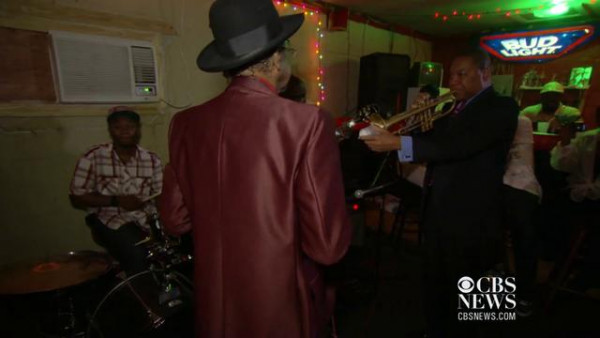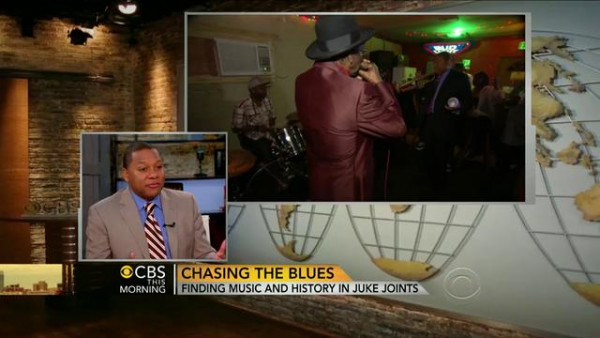In ‘Bessie’ the Empress of the Blues Finds New Audience on HBO
In the opening minutes of ‘Bessie,’ the HBO biopic about blues legend Bessie Smith premiering Saturday, May 16th, the titular character absorbs the warmth of a single spotlight with an air of faint applause surrounding her. Draped in the glamour of the roaring 20s and with a life far from her Chattanooga roots, Bessie never seems to escape the pain of an ever haunted past and like any artist of her time she channels that struggle in brilliant performance.
Her life cut short in 1937 at the age of 43, Smith never lived to see the rise of modern-day celebrity with motion picture deals or Grammy noms. Yet with a natural talent and her place as a top grossing female artist, she remains an icon to rock and roll, gospel, jazz, and even hip hop artists like Queen Latifah whose portrayal has garnered critical acclaim.
This weekend, as the Dee Rees directed film introduces the “Empress of the Blues” to a new audience, NBCBLK spoke to musicians and historians about her musical legacy and what viewers should do immediately after watching the film.
THE VOICE FROM CHATTANOOGA
“There was something mesmerizing, hypnotic in her voice. She cast this spell and in many ways transcended blues music“—Loren Schoenberg
Though Smith made over 160 recordings under the Columbia label—an astonishing feat for any artist of that time—to have heard her perform live was a rare gift as many recordings of the time were insufficient in capturing the booming strength of Bessie Smith’s voice.
Jazz historian Loren Schoenberg, a protege of famed bandleader Benny Goodman, describes Bessie’s ability to perform at “tent shows,” the often simplified concert venue in the rural south. “The sheer Goddamn strength in Bessie’s voice drills down to the basic essence of the human condition. You could listen to her and never get bored.”
“Hundreds, if not thousands would come,” he added. “There was something mesmerizing, hypnotic in her voice. She cast this spell and in many ways transcended blues music.”
No longer under the patronage of blues legend Ma’ Rainey (portrayed in the HBO film by Academy Award winner Mo’Nique), Smith ran her own roving musical review, at one point earning a record $2,000 a week and becoming one of the nation’s top traveling musicians.
Schoenberg, who serves as Artistic Director of the National Jazz Museum in Harlem, suggests viewers watch the real Bessie Smith in the only film she made before her tragic death, 1929’s ‘St. Louis Blues.’
“Everything you ever wanted to know about Bessie Smith is conveyed in the film,” Schoenberg says. “That scene when she’s tossed down on the ground and looks into the camera. That’s not acting, that’s her. Later, when she’s sitting at the bar and singing with the Hal Johnson chorus, you can distinctly hear her voice against 200 people.”
The film based on the popular W.C. Handy song of the same name is the only known recording of Bessie Smith performing outside the Columbia record label. The 15-minute short, available on YouTube, in Loren’s eyes, is as much of a true depiction of Bessie as we’ll ever get.
New found fans who want to hear her today are encouraged by Schoenberg to order a collection of Bessie Smith CD’s from UK-based Frog Records which in his opinion provides “the best sound quality” of any modern collection of Bessie Smith’s.
BLUES, THE GREATEST AMERICAN ART FORM
“She was a savant, in the depth of her understanding. Bessie Smith gave a voice to a whole generation who lived in the rural areas of America“—Wynton Marsalis
For Grammy award winner Wynton Marsalis, it’s all about the construction of a blues song. “The blues is the greatest of all American art forms,” he stresses. “It addresses all of the central issues of our way of life.”
The famed trumpeter spoke to NBCBLK ahead of judging the annual “Essentially Ellington” high school jazz competition in his role as artistic director of Manhattan’s Jazz at Lincoln Center.
“Human life is always the same issues: Marriage, Infidelity, Love, Lust, Death, Murder, Life, Work, Unemployment—familiar problems across the generations. [It] doesn’t matter where you are at the time, the arts all deal with these basic human rituals.”
“Sometimes you have an artist that can channel an understanding of the intensity of life,” Marsalis adds. “She was a savant, in the depth of her understanding. Bessie Smith gave a voice to a whole generation who lived in the rural areas of America. She channeled the aspirations of those people. She sang the blues with a certain feeling and depth where she understood the struggles of everyday people.”
Marsalis was first introduced to her music while researching an unlikely fan, the gospel singer and fellow New Orleans native, Mahalia Jackson. “It amazed me how the most pious of singers was a fan of Bessie Smith.”
Bessie’s legions of fans also include jazz singer Billie Holiday and (decades later) rocker Janis Joplin, who in 1970, purchased a tombstone to lay at what was Smith’s unmarked grave, 33 years after a car accident took her life.
For Wynton Marsalis and many who followed Smith’s work, there was no doubt her style had an effect on modern American music.
“The blues is such a profound form,” Marsalis shared, “Those twelve bars, the three basic formats of western music. More room to ‘respond’ than to ‘call,’ the use of hollers and shouts and cries, that human element. Just look at the lyrics to something like “Empty Bed Blues:”
I woke up this morning with a awful aching head
My new man had left me, just a room and a empty bed
Bought me a coffee grinder that’s the best one I could find
Oh he could grind my coffee, cause he had a brand new grind
“You know what they talking about,” Marsalis states broadly. “The use of metaphor and humor to romance. Because romance was a proposition, so [love making] is going on either way.”
The important ideal to Marsalis was that the songs were never nasty, but made full use of a creative blend of lyrics and leaving more to the imagination. In addition to “Empty Bed Blues”, Marsalis encouraged viewers to listen to “Back on Black Mountain” “Back Water Blues” and “All the Birds Sing Bass” which he lists as his favorites lyrically.
By Ryan Williams
Source: NBC News


